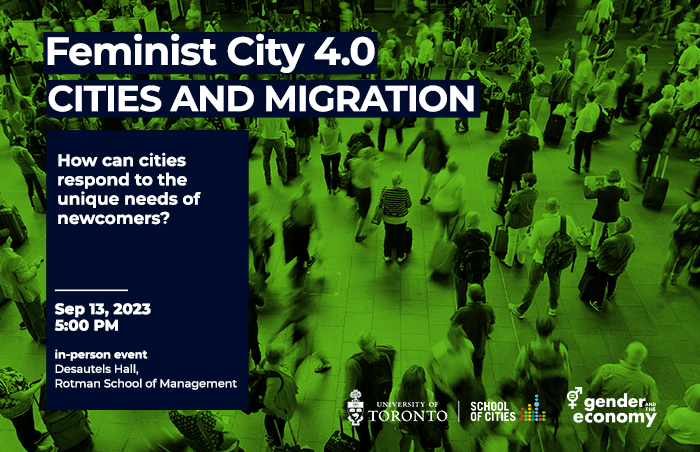Topic: Feminist City 4.0 – Cities and Migration
To further explore questions of gender equity in relation to cities and migration, GATE and the University of Toronto’s School of Cities co-hosted the fourth event in our popular Feminist City series.
Cities such as Toronto thrive on migration, and embracing newcomers is essential for a prosperous future. However, many immigrants, women in particular, often find themselves left behind when it comes to integration into the social and economic life of a city. We discussed topics around cities and migration with Sara Asayla, Executive Director of Newcomer Women’s Services Toronto (NEW), Tatiana Ferguson, co-founder of the Black Queer Youth Collective, Anna Triandafyllidou, Canada Excellence Research Chair in Migration and Integration at Toronto Metropolitan University (formerly Ryerson University), and Nicole Watson, Manager, Policing Reform and former Acting Director of the Newcomer Office at the City of Toronto Social Development, Finance and Administration division.
They highlighted some key considerations that will be important to consider as our cities tackle issues related to immigration:
- Social integration is a complex and multifaceted issue. For example, newcomers can face language barriers, which hinder their ability to access settlement support services and lead to delays in accessing healthcare.
- The rising cost of living poses a significant challenge. Limited full-time job opportunities increase the barrier to accessing social support, making it almost impossible to maintain a good quality of life.
- A new program model is needed to allow immigrants to gain Canadian experience through paid apprenticeships so that they can contribute to the economy with their valuable skills and education.
- There needs to be an intergovernmental strategy for creating pathways for undocumented people to gain citizenship.
- Support services for families who experience cultural differences are important. For example, support groups can be beneficial for parents navigating intergenerational cultural differences as they settle into Canadian life.
- More involvement and engagement from the private sector are needed. Larger-sized businesses can be involved in settlement programs and offer internships and apprenticeship programs for newcomers to Canada.
The panelists emphasized that all the actors in the spaces of migration and immigration can come together to provide a smoother and more seamless process of integration and resettlement; this includes religious organizations, charities, governmental sectors, the private sector, and universities and colleges.
“Immigration is a gendered process, which means that immigrant women in the process of migration, settlement, (and) resettlement are impacted differently than men […] There were caring responsibilities, family roles, and dynamics. When we think about migration policies, they’re really connected to housing policy, access to childcare policies, […] access to job market, (where) immigrant women are more heavily represented in the care economy and jobs (that) are more precarious in nature, access to care, access to education… there are so many factors that make the immigration journey more difficult and complex.”
– Sara Asalya, Feminist City 4.0
Watch the panelists discuss the role of cities in ensuring a smooth immigration process.
Additional resource: Report – Health and well-being among trans and non-binary immigrants & newcomers




